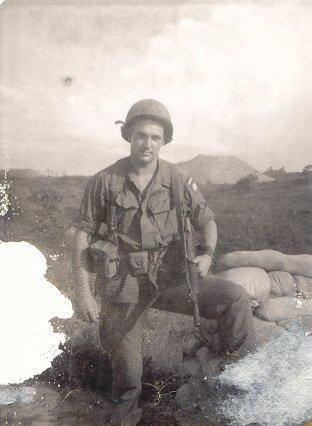3:51 | Jim Littig's unit was a long range reconnaissance patrol outfit but in Vietnam, you didn't need long treks to find the enemy. He details one memorable firefight that started when his men ambushed what they thought were a just a few men fleeing from the Battle of Hue.
Keywords : Jim Littig Vietnam long range reconnaissance patrol (LRRP) Hue LZ Panther 3 North Vietnamese Army (NVA) Viet Cong (VC) ambush shrapnel Preston Patrick Dudley Babb The Golden Brigade

The Army was short of officers, so when Jim Littig finished his basic officers course at Ft. Benning, he was sent to Ranger school the same day with jump school to follow. He had applied to Pathfinder school and was waiting for a slot when he got a lesson in how things get done in the Army.
Newly minted lieutenant Jim Littig was given a Long Range Reconnaissance Patrol unit just as the 82nd Airborne prepared to deploy to Vietnam. His team was highly experienced and even included what could only be described as soldiers of fortune.
His father told him, you will take ROTC in college because there's going to be another war. Jim Littig was a football player just like the old man and he took his talents to the University of Utah. As his graduation neared in 1967, he and his fellow officers in training naively worried that the war might be over before they could get there.
Everyone breathing in a uniform was hurriedly mobilized by the 82nd Airborne as they scrambled to reply to Gen. Westmoreland's demand for more troops. On the flight over, while some of the planes were grounded by weather, Jim Littig saw an amazing test of wills in an Airborne versus Air Force standoff.
Airborne units were always light in the vehicle department while on the ground, so as Jim Littig's men made their way toward their eventual destination in Vietnam, they "found" a jeep and their multi-talented medic made it legit with some white paint.
There were a lot of hairy firefights for Jim Littig in Vietnam. There was one in particular where the enemy had their old Soviet machine guns going in a hail of fire. After regrouping, his unit prepared a defense line at their fire base that included everyone from the rear, cooks and all.
Near the Cambodian border, some of Jim Littig's men getting water from a creek spotted a few of the enemy and opened fire. They quickly discovered they were adjacent to a camp of several hundred men. The ensuing fight stands out in his mind for a couple of reasons. The first occurred when fresh replacements were dropped off in the middle of the battle. The second was when he wrote up one of his men for a Medal of Honor.
It was hot when he left Vietnam in khakis but when Jim Littig got home to Oregon it was freezing cold. He took over a training company at Fort Lewis and then became a general's aide. The war was beginning to wain and he was one of the few that he knew that would return for a second tour.
It's all about the connections. Jim Littig was heading to Vietnam for a second tour and was slated to go to a replacement detachment. Oh no, said a friend way up the chain. He would command his own company, leapfrogging the waiting list. When he got there, he discovered that his outfit had a lot of misfits.
Jim Littig shuffled through several assignments as the war was winding down for US forces. Vietnamization was underway with varying results. When he had to miss a much anticipated Navy lunch aboard ship, he was disappointed, but it turned out that he was lucky.
Jim Littig saw a lot of intense combat on his first tour of Vietnam which created a tight bond with the men in that unit. On his second tour, he did not face a lot of fire and he also moved around from assignment to assignment, so there was not such a tight relationship. He did have a good relationship with Gen. Ngo Quang Truong, a very capable ARVN commander.
Later in his Army career, it was time for a masters degree and Jim Littig chose an unusual major. This led to an assignment which found him in South Africa just as the country was undergoing monumental change.
To Jim Littig, the way the end of the war unfolded was very irritating, with multiple failures by the government. The place made quite an impression on him. He has been back to Vietnam several times, including one memorable trip that was cut short.
It is important to remember why we were there. To Jim Littig and to President Kennedy, it was a place to take a stand against communism. We were looking for a fight. On a lighter note, he remembers the songs that he heard there and that take him back to that time.

Photos provided by Jim Littig from his time in Vietnam in 1968.